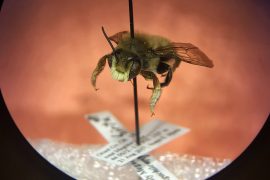When thinking about the study of “Applied Linguistics” not much may come to mind. Most people say “Doesn’t that mean when you can speak a bunch of languages?” Applied Linguistics reaches far more than just learning another language!
Applied Linguistics brings social issues, like bias to light. Language bias is the assumption that there is a right way to speak or write, and if someone is not speaking or writing in that way they could be subjected to discrimination. A person’s language ties in within their identity and who they are. When the way that they speak or write is made fun of or discriminated against, most times the person feels the need to re-learn the “correct” ways to speak and write to fit in. The Reimagine PSU project aims to bring diversity, education, and inclusivity issues to light and begin the process of giving justice to those who have experienced racism or discrimination on campus.
The Linguistic Inclusivity Diversity Awareness project (LiDA) is working with ReImagine PSU to enforce a language bias policy for students, faculty, and staff. I spoke briefly with Dr. Lynn Santelmann who is the department chair of Applied Linguistics and principal investigator of the ReImagine PSU project. After speaking with Dr. Santelmann revealed that, “language diversity is not a big thing on campus”. No specific languages or cultures are put on display for appreciation on campus, other than the diverse clubs who promote cultural nights themselves, rather than the entire institution. LiDA’s mission statement on their website is to, “raise awareness and address systemic language bias at Portland State University”. With more diverse students coming to PSU, the more diverse social and language backgrounds are for incoming students. This is the cause of one of LiDA’s biggest goals, stated on their website is that, “we hope to educate all community members about linguistic diversity and the biases that come with it to better encourage change towards a more supportive community for everyone.”

But… How can language bias be actually harmful to the PSU community? Dr. Santelmann stated, “The ‘right’ way to speak is based on educated white upper class norms and the way you learn to speak the ‘right’ way by going to good schools and associating with the ‘right’ people. The academic expectations send out a message [that] if you dont speak or write the “right” way, [it] means you aren’t smart enough and makes it hard to succeed. These norms have nothing scientific, they are mainly just people’s personal opinions about language, there’s not a full explanation.” Some who have encountered language bias, feel that they’ve had to sacrifice their identity and lose important ties that they once had within their language or culture. When someone grows up in a culture where English isn’t their first language and transitions to an American school system, it can be hard for the student to ease back into their culture due to potential ridicule and having the education that having an accent or speaking in what society would consider outside the accepted norms. This can make someone feel that they have to sacrifice parts of their culture to be able to fit in. I also spoke with Dr. John Hellermann, who is a professor in the Applied Linguistics department and co principal investigator for the LiDA project. Dr. Hellermann stated, “When people are discriminated against for the way they speak or write they don’t feel good about themselves and feel belittled. When I talk to intro linguistics students and say everyone has an accent it’s a new idea for a lot of people, and when they think about it they say ‘I don’t have an accent, they do!’. Language is infinitely variable. Like any discrimination is harmful, it prevents people from reaching their full potential.” By knowingly or unknowingly making fun of another person’s language, you can make someone feel out of place, that they don’t belong, or that they should have to change a part of themselves to be able to be treated equally amongst the rest of the community. However, there are numerous ways to combat and be educated on language bias.
Dr. Santelmann said that, “Awareness is a lot of it. [For faculty, it’s important] to look at your grading criteria when assessing written or speaking material. Are you assessing the material or language? Other than when things are needing to be corrected unlike saying, ‘you cant talk like that.’ It would be better to say, “if you want it to sound academic you can say..” as long as someone can understand [what they’re saying].” Making fun of someone’s use of grammar, accent, dialect, or way of writing is contributing to the problems language bias brings to the community. Other than spreading awareness, Dr. Hellermann suggests taking an introductory linguistics course or familiarizing yourself with language by reading books or listening to podcasts, like “Lingthusiasm” by Gretchen McCulloh, and “The Allusionist” by Helen Zaltzman. For those who aren’t studying applied linguistics, Dr. Hellermann suggests a podcast done by John Mcwhorter called “Lexicon Valley”. This is a good podcast for those who are not exactly familiar with linguistics!
I asked both Dr. Santelmann and Dr. Hellermann what a language bias would look like on campus. Dr. Santelmann would like to see an embrace in the idea that linguistic differences are a point of strength but that they can also be used as an asset. By having linguistic differences, it can promote multilingualism, be helpful in a situation where language barriers are present, and can promote diversity in media and literature. Although, what would a language bias statement or policy entail? Dr. Santelmann stated, “At the very base it would be a statement that would include language in the diversity department goals and that we would not discriminate against types of language, and languages used at PSU. LiDA would then include issues with language and identity in training faculty and staff.” Dr. Hellermann’s views align with Dr. Santelmann, that the statement, “would let people know that there is no correct way to speak or write a language, and that if people prescribe language to other people and tell them they should or shouldn’t do this, that they’re making judgements about people [rather] than their [use of] language”. By including a language bias statement, it can help students and staff feel more welcome and included. Doing this can also bring a larger and diverse crowd to campus, and can put all students on an equal baseline academically. For faculty and staff, being specifically trained on language bias can help them identify it and put a stop to it.
If you are interested in being surveyed and interviewed for the LiDA project about your language experiences on campus, please contact lidaproject@pdx.edu and visit https://sites.google.com/pdx.edu/lidaproject/home to take the survey.
References
The Cambridge Introduction to Applied Linguistics
Lexicon Valley with John McWhorter.
Interviewees: John Hellermann (Professor Department of Applied Linguistics), Lynn Santelmann(Professor/Department Chair Department of Applied Linguistics)





